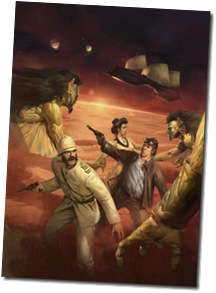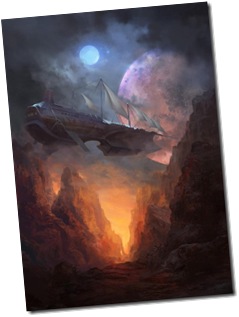 As a follow-up to my (p)review of Space 1889 I managed to get in touch with the people responsible for the popular roleplaying game and do an interview with one of the creators, Stefan Küppers. He worked as author and editor on the German edition of Space 1889. My thanks go out to Angus Abranson and Patric Götz for making this possible. To learn more about Space 1889 check out the Kickstarter project page (for the upcoming English edition) or the Uhrwerk Verlag website (for the German edition).
As a follow-up to my (p)review of Space 1889 I managed to get in touch with the people responsible for the popular roleplaying game and do an interview with one of the creators, Stefan Küppers. He worked as author and editor on the German edition of Space 1889. My thanks go out to Angus Abranson and Patric Götz for making this possible. To learn more about Space 1889 check out the Kickstarter project page (for the upcoming English edition) or the Uhrwerk Verlag website (for the German edition).
Stargazer: Could you please introduce yourself to our readers? Who are you and what is/was your role in the development of the new Space 1889 roleplaying game?
Stefan: I am Stefan Küppers, gamer since 1984, author since 1995. I worked for the German Cthulhu-Roleplaying game and for Das Schwarze Auges (The Dark Eye), a famous German Fantasy-Roleplaying game. For these I created and described the world (and its various settings such as Myranor (High-Fantasy), Aventurien (Classic-Fantasy), Tharun (Asian-Fantasy)) and wrote adventures to explore it.
I worked as an author as well as an editor and developer. I am chief editor for the German Space: 1889 since 2010. Me and my team created the new rulebook and further publications: Venus and Mercury are already in production, more things are to come soon…
Stargazer: What was the first roleplaying game you played and when did you first encounter Space 1889?
Stefan: My very first roleplaying game was Das Schwarze Auge, followed by many other games like Call of Cthulhu and Traveller. In 1988 I discovered Space: 1889 and was fascinated by the world and its potential for adventures.
Stargazer: What made you pick the Ubiquity System for Space 1889? Was the decision to drop the original game system made early on or was it made after you started to work on the project?
Stefan: It was the decision of Patric Götz, and I think it was a good decision. The Ubiquity System works very well with the world and the style of the game.
Stargazer: Are there plans to release the game for other rules systems as well? I am sure a lot of gamers would love to have a Fate edition for example.
Stefan: There are no plans yet, but in the Kickstarter we gave the option, that the adventures will be put in Savage-Worlds-Rules. Fate could be a good option for gaming in the World of Space: 1889 as well.
Stargazer: The new Space 1889 not only has new rules but the setting itself was changed. The old Space 1889 followed real history more closely than its successor? Why were these changes made?
 Stefan: It was a decision by Frank Chadwick. Except for Frank’s changes, I prefer a world based on real-world history and background. And in my opinion this is a basic for Space: In contrast to other games which play with locations or characters from fiction (e.g. Sherlock Holmes), we don’t. We have also done some little changes to reduce the political conflicts between countries. The reason is our focus on the roleplaying aspect rather than the wargaming aspect.
Stefan: It was a decision by Frank Chadwick. Except for Frank’s changes, I prefer a world based on real-world history and background. And in my opinion this is a basic for Space: In contrast to other games which play with locations or characters from fiction (e.g. Sherlock Holmes), we don’t. We have also done some little changes to reduce the political conflicts between countries. The reason is our focus on the roleplaying aspect rather than the wargaming aspect.
We wanted to provide a background in which German, British, French, and other player-characters can interact better with one another.
Stargazer: Do you think the change in political correctness over the years since the game was originally published has changed the perception of imperial expansion and colonization as portrayed in Space 1889?
Stefan: Nowadays we think about these subjects more carefully than 20 or 30 years ago. We are all people of the 20th century. Colonialism, misogynism, and the oppression of minorities are something that should be part of history. In a game that uses historical background we should not ignore historical reality, but we can (carefully) deal with it. In the end, it’s the decision of the people playing together whether their characters adopt the ideology of the 19th century or not and in how far the gamemaster introduces NPCs with prejudices typical of that time.
Stargazer: How does the game deal with subjects like racism and misogynism in the Victorian Age?
Stefan: The rulebook names the facts as they were back then. There is an article that gives some information about minorities in the 1880th, and how you might use this in gaming. For example, we noted down what (most) Europeans used to think about Asians (or Martians about humans). But it is not the reality of the game – in the game all people have their own characters independent from their home country. There are good and bad as well as intelligent or stupid Russians, Germans, English, Japanese, Chinese, Irish, Welsh…
And we give examples for extraordinary women of the age as well. Examples that can be used as an inspiration for player characters – but that is nothing new. We adopted that from the original Space: 1889.
Stargazer: What plans do you have for the future of Space 1889? Back in the day there were Space 1889 boardgames and even a computer game. Are there plans along these lines for the new edition?
Stefan: We are working on the Venus sourcebook and the Mercury sourcebook. Further plans are sourcebooks on Technology and Inventions, Mars, and Earth. We are also thinking about more adventures and some other projects for the roleplaying game, something to present interesting locations and events.
Some people asked about the strategic rules as used in Sky Galleons and Ironclads & Ether Flyers. We have plans to bring these back too, but many other things must be done before.
Stargazer: In the last few years Steampunk and related genres have become more and more popular. Do you have a pet theory why that is the case?
Stefan: It is part nostalgia and part search for the “good old times.” Many people would like to have a well-ordered world without the rapid changes of our time. They are looking for a time or place in which people treat each other more respectfully and politely.
They can find this in Victorian England or Wilhelminic Germany and its culture. And it is also the look of this age they like: the technology, the buildings, the costumes.
Stargazer: The roleplaying games industry has changed a lot over the last decades. One of the major changes is how new games are financed. Kickstarter and similar platforms are a popular way to raise money and get the customers involved. Is this a change you’re applauding or is it something you adopted out of necessity.
Stefan: Kickstarter and its followers are a great chance for people who want to share their dreams with the world. They can look for backers and money to get production and publication done. That is a great chance for little projects, also in the roleplay-community. But it’s too bad that may great things can *only* be realized in the framework of the Kickstarter-project and will never be produced again once the Kickstarter-project is done.
Fortunately, this is not the case with Space: 1889. I can assure you, that there will still be products published on a regular basis once the Kickstarter-project is done.
Stargazer: Thanks a lot for taking your time to answer our questions. The team of Stargazer’s World wishes everyone involved with Space 1889 and the Kickstarter project all the best!
